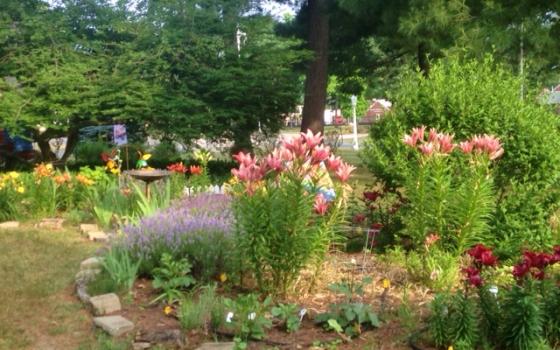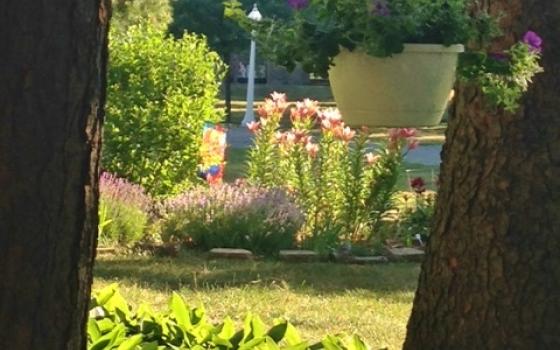As I write this it is one of those perfect Michigan summer mornings — temperature in high 70s, low humidity, sun shining and the flowers fully blooming in all their rich colors. One of the sisters with whom I live is our gardener, and she has created a most splendid banquet of myriad flowers whose colors were profuse this morning.
I so needed this "chapel" within which to pray. These past weeks have been filled with the violence of the massacre at the gay club in Orlando, Florida; the vote by the United Kingdom to leave the European Union and what that signifies; and International Refugee Day, which confronted us with the reality of over 65 million refugees in 2015.
As I "stared" at the flowers and became lost in the colors, I wondered what it would be like to be blind. To never have seen the great diversity and richness of flowers or the squirrels that scamper and play all day or the sights of city streets or the beauty of the lakes and oceans or the exquisite uniqueness of each other as we go about our lives.
As I prayed I realized that in fact we are all blind. We really don't see all that is there.
No wonder contemplation is "taking a long loving look at the real." We need to create the space in us to see more broadly and deeply than a cursory look provides.
Of course, what we see is limited by what our consciousness allows us to see. The values, assumptions, worldviews which are operative in our personal life as well as in the culture within which we live, the faith tradition we profess, the economic class we identify with, provide the lenses through which we view the world. Contemplation opens us to broaden those lenses; to develop our consciousness so that we can see with greater complexity and inclusivity.
As I try to take that long loving look at what is happening in our world, I realize that what we tell ourselves about what we see — the story or the narrative — out of which we act is crucial. The old story no longer works, and the new story is only emerging. I believe we are living between a story of separation and a story of communion.
President Obama called Omar Mateen's shooting spree an act of terror and of hate. Mateen was influenced by the propaganda of the Islamic State and a belief that gay, lesbian and transgendered persons are immoral, not like normal persons, with the subtler message that their existence need not be tolerated. As I read the various analyses of what happened with the U.K. vote to leave the European Union, I hear the story of separation from those who have welcomed the "other" and then perceive them as taking away their jobs, their culture, their language and their traditions. On the other side are those who tell a different story, having experienced the richness of the many cultures within England and understand that interdependence is the future. I hear a similar division in talking about the refugee situation. Many people extend compassion toward them and willingly welcome them into their country. Others see them as a threat that should be kept out of their country.
We keep telling a story rooted in a modern worldview. It is a story that tells us we are separate. Each person must look out for him/her self. There is not enough for everyone. There will be winners and losers. It keeps us from seeing beyond our own needs and wants.
We need to tell the other story, a story of communion — of seeing and welcoming the other — of belonging to each other not only to other human persons but to all beings.
As I was reflecting on being blind, I recalled one of my favorite Gospel stories. It is the story of Bartimaeus. He was blind, and when he encountered Jesus, Jesus asked Bartimaeus what he wanted him to do for him. Bartimaeus replied, "That I may see," and Jesus restored his sight.
As I reflect on that miracle, I believe Jesus wanted to teach us that we all need to see in new ways. Jesus' life made it clear that his worldview held that all were equal. All persons regardless of how they ranked in the very strict purity code of his time were embraced by him. Jesus spoke of communion and welcomed everyone to eat at his table. He lived out of abundance and not scarcity and saw the natural world as the world in which God's kindom would come.
That worldview, that consciousness, is needed today. I believe it is deep within us waiting to be awakened. It is what we see when we "take a long loving look at the real." It is the basis for the story of communion.
It is only softening our eyes and opening our hearts that will free us to embrace the vibrant colors of each person and of our world. When we are no longer blind we will see in new ways. When we see in new ways we will tell the story of communion.
[Nancy Sylvester, IHM, is founder and director of the Institute for Communal Contemplation and Dialogue. She served in leadership of her own religious community, the Sister Servants of the Immaculate Heart of Mary, Monroe, Michigan as well as in the Presidency of the Leadership Conference of Women Religious. Prior to that she was National Coordinator of NETWORK, the national Catholic social justice lobby.]
To read Nancy Sylvester's entire series, click on her author name above or click here to see a list of her columns.


